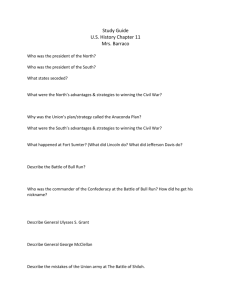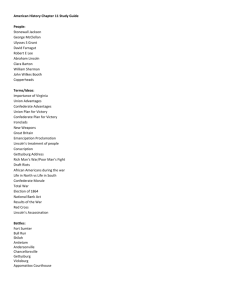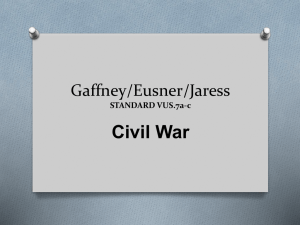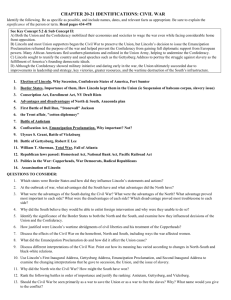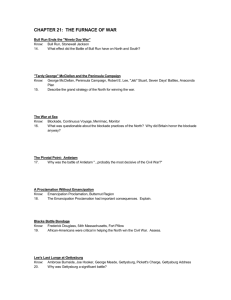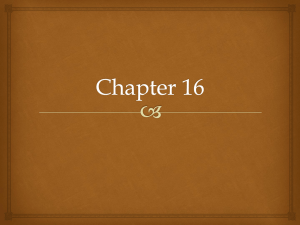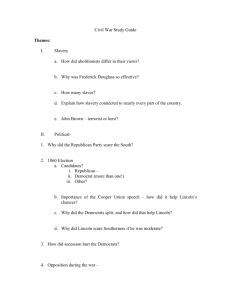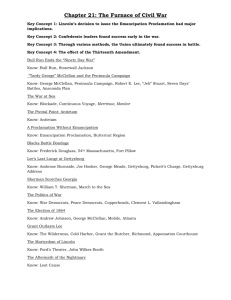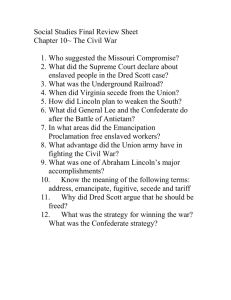Document
advertisement
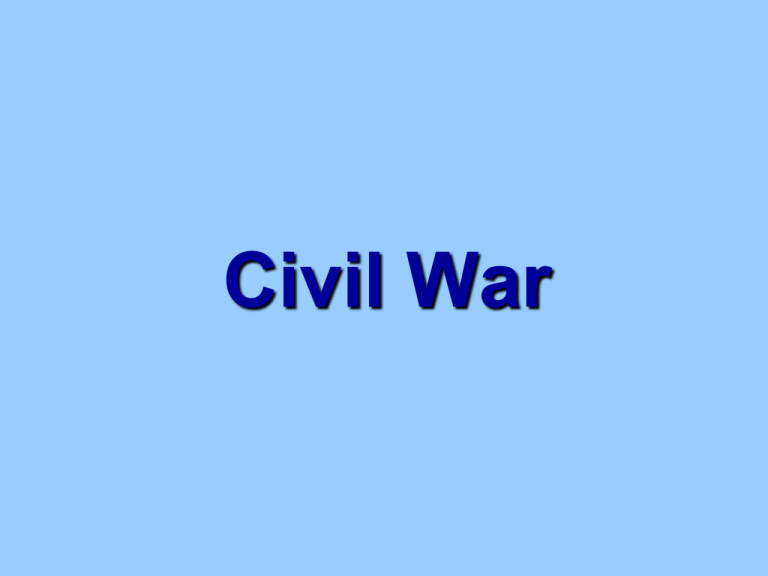
Civil War What political party was Abraham Lincoln? •Republican Who won the 1860 presidential election? • Abraham Lincoln Why did some Southern states refuse to accept Lincoln’s election as president? • They feared Lincoln would try to abolish or at least further limit slavery. What action did some Southern states take in the winter of 1860-1861? •Seceded from the Union What did it mean for a state to secede from the Union? •Withdraw from the Union What new nation did the Southern states establish after they seceded from the Union? • Confederate States of America – also called • The Confederacy Who was president of the Confederacy? •Jefferson Davis Where did the Civil War begin? • Fort Sumter in Charleston, South Carolina What were the dates of the Civil War? •1861 – 1865 What is a civil war? •A war between people of the same country What have the Virginia Standards of Learning identified as the seven causes of the Civil War? • 1) Sectional debate over tariffs, the spread of slavery into the territories, and the nature of the Union (states’ rights) • 2) Northern abolitionists vs. Southern defenders of slavery • 3) Dred Scott Decision • 4) Uncle Tom’s Cabin • 5) Poor presidential leadership • 6) Failed compromises • 7) Lincoln’s call for troops Define emancipation. •Freeing the AfricanAmerican slaves th 19 What early century debate reached a climax during the Civil War? • The power of the federal government vs. states’ rights Identify Abraham Lincoln. • President of the United States during the Civil War • Against secession • Believed the Union should be held together by force, if necessary Identify Jefferson Davis. • President of the Confederate States of America • United States senator from Mississippi, when Mississippi seceded Identify Ulysses S. Grant • The greatest Union general • Won victories over the Confederate army after several other Union commanders had failed • Accepted Lee’s surrender at Appomattox Identify Robert E. Lee. • Confederate general who commanded the Army of Northern Virginia • Against secession • Did not believe the Union should be held together by force • After the war, Lee encouraged Southerners to accept defeat and unite as Americans again Identify Frederick Douglass. • A former enslaved AfricanAmerican • Became an important African-American abolitionist • During the Civil War, encouraged President Lincoln to recruit former enslaved African-Americans to fight in the Union army. According to the Standards of Learning, what were the two most important battles of the Civil War? •Antietam •Gettysburg In what state was the Battle of Antietam fought? •Maryland How did the Northern press interpret the military stalemate at Antietam? • As a major Union victory, because Lee and his Confederate army retreated back into Virginia Why was the Battle of Antietam very important? • North’s belief that Antietam was a Northern victory allowed President Lincoln to issue the Emancipation Proclamation Why did the Battle of Antietam mark a new stage in the Civil War? • After Antietam, President Lincoln announced the Emancipation Proclamation Who issued the Emancipation Proclamation? •President Abraham Lincoln What did the Emancipation Proclamation do? • Freed all slaves who lived in states still in rebellion on January 1, 1863 What was the North’s war aim before the Emancipation Proclamation? •Preservation of the Union What were the North’s war aims after the Emancipation Proclamation? • Preservation of the Union • Abolition of AfricanAmerican slavery What two European countries considered aiding the Confederacy? • Great Britain • France What effect did the Emancipation Proclamation have on England and France? • Discouraged them from siding with the Confederacy • The governments of England and France did not want to appear to support slavery. What battle was the military turning point of the Civil War? •Gettysburg Where was the Battle of Gettysburg? •Pennsylvania Which side won the Battle of Gettysburg? •The North •The Union Army What did Lincoln identify as the North’s two war aims in the Gettysburg Address? • Preservation of the Union • Abolition of Slavery What did Lincoln believe was the nature of the Union? • The United States was one nation, instead of a federation of independent states. What did the South think was the nature of the Union? • The states had freely joined the Union and could freely leave or secede. What vision did President Lincoln describe for the United States in the Gettysburg Address? • The United States was dedicated to the idea that “all men are created equal.” In the Gettysburg Address what did Lincoln call a “Second American Revolution”? •The Civil War Who said the United States was ruled by a government “of the people, by the people, and for the people”? •Abraham Lincoln In what speech did Lincoln use the phrase “of the people, by the people, and for the people”? •The Gettysburg Address According to what Lincoln said in the Gettysburg Address, what institution must not exist in the United States? •African-American Slavery What happened at Appomattox? • Lee surrendered to Grant. • The Civil War ended. Where did the Civil War end? • Appomattox Courthouse in Virginia How did the Civil War impact AfricanAmericans? • Emancipation Proclamation allowed for the enlistment of African-American soldiers in the Union Army • During the Civil War, many enslaved African-Americans gained freedom by running behind Union lines How did the Civil War affect the common soldier? • Hand-to-hand combat • Brutal warfare • Lonely and boring camp life How do historians know about the life of the common soldier during the Civil War? • War time diaries • Letters sent home by the soldiers What did Southern soldiers often find when they returned home after the Civil War? • Their homes were destroyed • Their families were poor How did the Civil War physically affect many soldiers on both sides? • Returned home wounded or crippled • Lived with permanent disabilities During the Civil War, what roles were women required to assume on the home front? •Nontraditional roles Describe the role of many women during the Civil War. • Managed homes and families without much money or food • Faced poverty and hunger What new roles did women assume during the Civil War? • Ran farms • Worked as nurses • Worked in war industries
